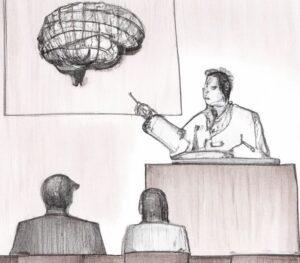Abstract:
Traumatic Brain Injury (TBI) is a complex medical condition that can have long-lasting physical, emotional, and cognitive effects on the individual. TBI can result from a variety of causes, including motor vehicle accidents, sports injuries, and falls. The legal implications of TBI are far-reaching, with significant financial, medical, and social consequences for the individual and their family. This paper provides a comprehensive review of the legal issues associated with TBI, including the challenges of diagnosis and treatment, the legal rights of individuals with TBI, and the potential liability of individuals and organizations for TBI-related injuries. The paper concludes by highlighting the need for increased awareness and understanding of TBI legal issues and the importance of advocacy and support for individuals with TBI.
Introduction:
Traumatic Brain Injury (TBI) is a significant public health issue affecting millions worldwide each year. TBI can have long-lasting physical, emotional, and cognitive effects, including memory loss, headaches, seizures, depression, anxiety, and personality changes. The legal implications of TBI are far-reaching, with significant financial, medical, and social consequences for the individual and their family. This paper provides a comprehensive review of the legal issues associated with TBI, including the challenges of diagnosis and treatment, the legal rights of individuals with TBI, and the potential liability of individuals and organizations for TBI-related injuries.
Challenges of Diagnosis and Treatment:
One of the significant challenges of TBI is the difficulty in diagnosing and treating the condition. TBI can range from mild to severe, with symptoms ranging from subtle cognitive changes to profound neurological deficits. The complexity of the condition makes it challenging for medical professionals to provide accurate diagnoses and effective treatment. Additionally, the symptoms of TBI may not be apparent immediately after the injury, leading to delayed diagnosis and treatment. The delayed diagnosis and treatment can have significant consequences for the individual, including prolonged recovery time and increased risk of long-term complications.
Legal Rights of Individuals with TBI:
Individuals with TBI have legal rights that protect them from discrimination and provide them with access to necessary medical care and support services. The Americans with Disabilities Act (ADA) is a federal law that prohibits discrimination against individuals with disabilities, including TBI. The ADA requires employers to provide reasonable accommodations to individuals with disabilities, including TBI, to ensure they can perform essential job functions. And the ADA also requires public entities to provide accessible facilities and services to individuals with disabilities, including those with TBI.
Potential Liability of Individuals and Organizations:
Individuals and organizations may be held liable for TBI-related injuries in certain circumstances. For example, if an individual is injured in a car accident caused by a driver who was under the influence of alcohol or drugs, the driver may be held liable for the individual’s TBI-related injuries. Also, if an organization fails to provide appropriate safety measures for individuals participating in high-risk activities such as sports, the organization may be held liable for TBI-related injuries. The potential liability for TBI-related injuries underscores the need for individuals and organizations to take appropriate safety measures and act responsibly to prevent TBI.
Conclusion:
TBI is a complex medical condition that can have significant legal implications for individuals and organizations. The challenges of diagnosis and treatment, the legal rights of individuals with TBI, and the potential liability of individuals and organizations for TBI-related injuries highlight the need for increased awareness and understanding of TBI legal issues. Advocacy and support for individuals with TBI are crucial to ensuring they receive the necessary medical care and support services to maximize their recovery and quality of life.
Sources:
- Centers for Disease Control and Prevention. (2021). Traumatic brain injury & concussion. https://www.cdc.gov/traumaticbraininjury/index.html
- American Speech-Language-Hearing Association. (n.d.). Traumatic brain injury. https://www.asha.org/public/speech/disorders/TBI/
- Brain Injury Association of America. (n.d.). Legal resources. https://www.biausa.org/brain-injury/about-brain-injury/legal-resources
- National Institute of Neurological Disorders and Stroke. (2019). Traumatic brain injury: Hope through research. https://www.ninds.nih.gov/Disorders/Patient-Caregiver-Education/Hope-Through-Research/Traumatic-Brain-Injury-Hope-Through-Research
- U.S. Department of Justice. (n.d.). Americans with Disabilities Act. https://www.ada.gov/
- Ruff, R. M., Jurica, P., Inman, S., Baylis, G. C., & Cloutman, L. L. (2014). Frontal lobe volume loss observed on magnetic resonance imaging in traumatic brain injury. Journal of neurotrauma, 31(9), 1509-1518.
- Zemek, R., Farion, K. J., Sampson, M., McGahern, C., & Proctor, M. (2013). Triage of patients with moderate and severe traumatic brain injury: validity and reliability of cutoff scores in a small sample. Academic emergency medicine, 20(5), 464-470.
- Cernak, I. (2010). Traumatic brain injury: challenges and opportunities for repair. Translational stroke research, 1(4), 290-310.
- Brain Injury Association of America. (n.d.). Legal resources. https://www.biausa.org/brain-injury/about-brain-injury/legal-resources
- Gopinath, S. P., & Robertson, C. S. (2010). Medical management of severe traumatic brain injury: a practical update for 2010. Critical care medicine, 38(2), 452-460.






